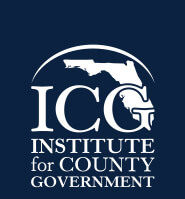In response to private-sector technology growth across the country, the Florida Association of Counties added a new feature to its 2018 Policy Conference. Specifically, a day of innovation preceded the two days of policy workshops, and private sector innovators were invited to demonstrate their products and address questions from county officials. Among the vendors showcasing their products were those representing autonomous vehicles, public safety drones, flood resiliency technology, 3-D construction printing, small cell technologies, and smart solar. The goal of that conference element was to help counties understand how disruptive technologies work, how they impact counties, and what regulatory or policy options should be considered when they are introduced locally. To compliment this portion of the day, attendees participated in afternoon field trips, where they visited a new community known as the first solar town in the nation, followed by a tour of an advanced multi-purpose public safety complex.

Following the conference, some counties expressed interest in hosting a future FAC Innovation and Policy Conference, where they could showcase unique aspects of their community and highlight innovative best practices in county government. To that end, FAC is soliciting proposals from counties which are interested in hosting the 2022 FAC Innovation & Policy Conference.
To begin the application process, send a letter of intent via email to Executive Assistant, Faye Brainard by June 14, 2021. Proposals with a complete application and any supporting documents are due no later than July 16, 2021.
FAC/ICG Innovation Day Charlotte County
September 26-27, 2018
The inaugural ICG Innovation Day preceded the two days of policy workshops, where private sector “innovators” were invited to demonstrate their products and address questions from attendees. Among the vendors showcasing their products were those representing autonomous vehicles, public safety drones, flood resiliency technology, 3-D construction printing, small cell technologies, and smart solar. The goal was to help counties understand how these disruptive technologies work, how they impact counties, and what regulatory and/or policy options should be considered when they are introduced locally. To compliment this portion of the day, attendees participated in afternoon field trips, where they visited Babcock Ranch, a new community known as the first solar town in the nation, followed by a tour of the Charlotte County Public Safety Facility, an advanced multi-purpose public safety complex, which is a model for other communities.
FAC/ICG Innovation Day Bay County
September 25-26, 2019
The ICG Innovation Day again preceded the two days of policy workshops at the FAC Innovation and Policy Conference in Bay County. The day’s theme centered on lessons learned from Category 5 Hurricane Michael with attendees getting an ‘on-the-ground’ look at disaster response and recovery to get a clear picture of just what happened in the aftermath of October 10th, 2018. The ICG partnered with Catholic Charities for a service day to assist residents who are still recovering from the storm. Approximately 30 commissioners and staff spent several hours at a residence in Bay County clearing storm debris from the property.For those opting not to participate in the community service project, ICG organized and offered two learning sessions:

